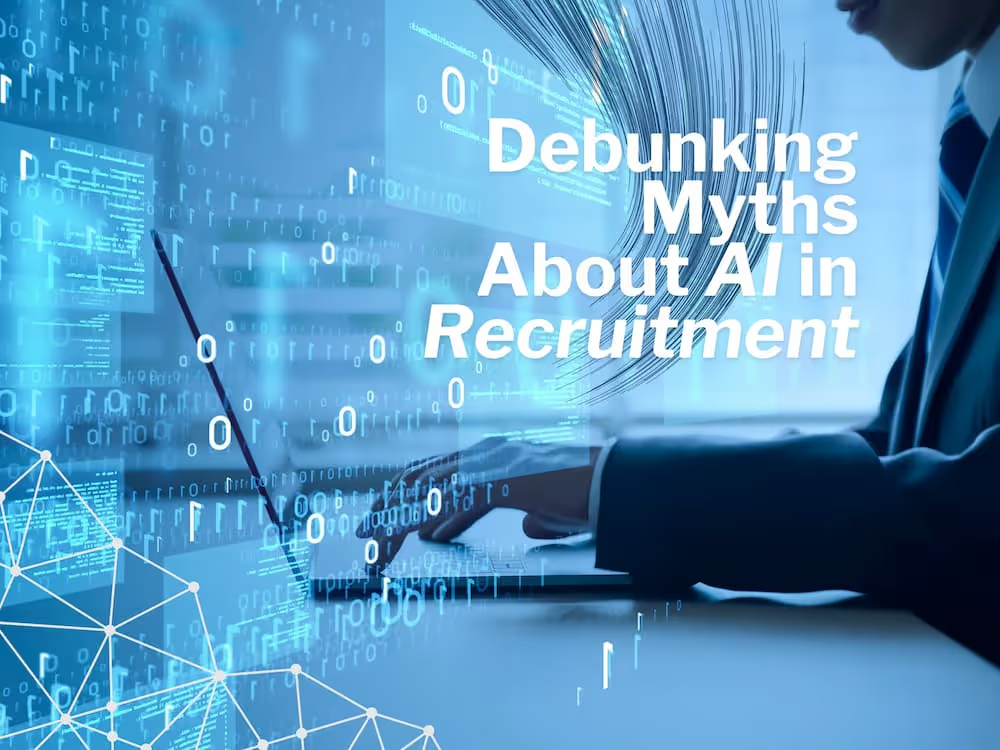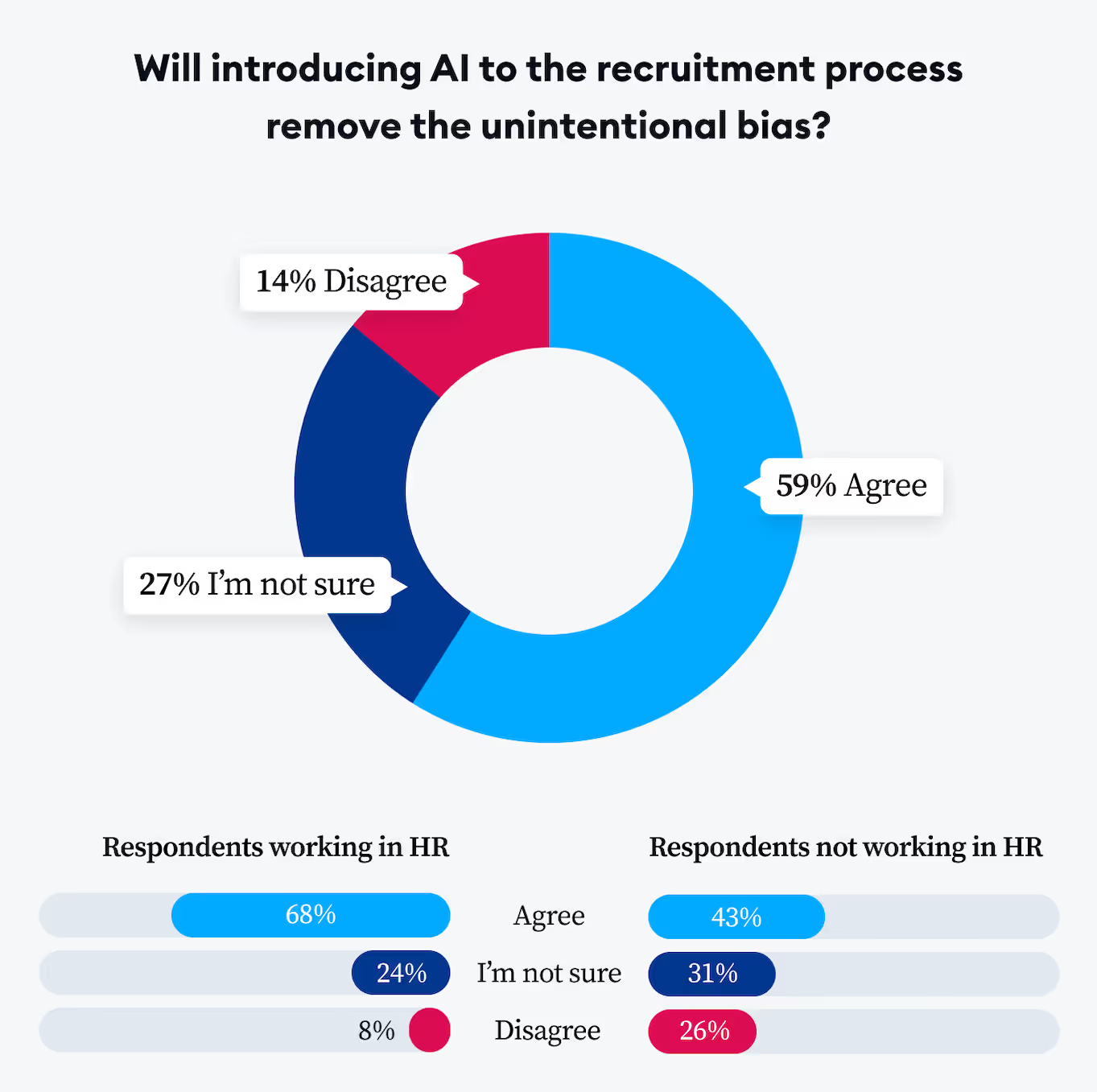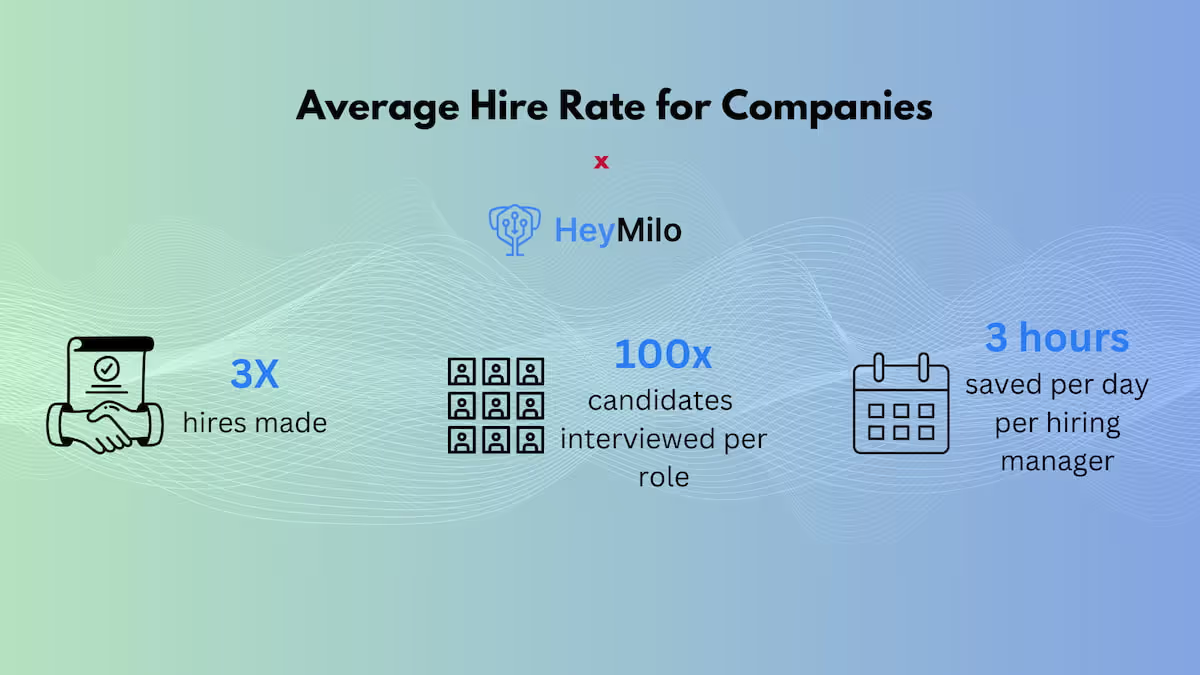Debunking Myths About AI in Recruitment
Artificial Intelligence (AI) is revolutionizing every single industry, and AI in recruitment is no exception. So, we’ve identified several myths surrounding the role of AI in hiring that need to be addressed and debunked. Let’s dive into these misconceptions and clarify how AI is the hiring solution recruiters and hiring managers were subconsciously looking for:

Artificial Intelligence (AI) is revolutionizing every single industry, and AI in recruitment is no exception. So, we’ve identified several myths surrounding the role of AI in hiring that need to be addressed and debunked. Let’s dive into these misconceptions and clarify how AI is the hiring solution recruiters and hiring managers were subconsciously looking for:
Debunking Myths About AI in Recruitment
With today’s world changing at a pace the public has never seen before, Artificial Intelligence (AI) is at the forefront of this change, revolutionizing every single industry, and AI in recruitment is no exception. Unfortunately, with every bit of change launching us forward, comes the myths and misconceptions creating fear and uncertainty within the masses that holds us back. So, we’ve identified several myths surrounding the role of AI in hiring that need to be addressed and debunked. Let’s dive into these misconceptions and clarify how AI is the hiring solution recruiters and hiring managers were subconsciously looking for:
Myth 1: AI Will Replace Human Recruiters
One of the myths we’ve heard time and time again is that AI will completely replace human recruiters. Yes, AI can automate repetitive tasks and streamline the recruitment process in order to save time without cutting corners, but it cannot replicate the human touch thats critical for building relationships and assessing cultural fit. Korn Ferry highlights the importance of maintaining a human presence in recruiting because human recruiters bring empathy, intuition, and personal experience to the process, which are absolutely essential for hiring top talent, something AI will never truly be able to replicate nor replace.
Myth 2: AI is Biased
There is a widespread concern that AI can perpetuate biases, but the reality is not even close to that. It’s quite obvious that AI systems can indeed be biased if they are trained on biased data, however the truth of the matter is that, when designed and audited correctly, AI can help reduce bias in recruitment by a long shot. Forbes actually goes further into detail about how AI interviews and screenings can lead to decreased gender gap by 30%, and since AI can focus on candidates' skills and qualifications, its able to remove human biases related to gender, race, or age all together. Though the key to maximize effectiveness lies in ensuring the AI algorithms are regularly monitored and updated to prevent any form of discrimination.
In a study done by Tidio, they asked 1068 people varying questions about AI in the recruiting industry. One of their notable findings was that 68% of professionals in HR agreed with the fact that introducing AI to the recruitment process will remove unintentional Bias.

Myth 3: AI Makes the Recruitment Process Impersonal
In contrast to what many may think, AI actually presents the opportunity to make the recruitment process even more personal than it is now. One may argue that claim is completely bogus, but factually, by handling redundant tasks, AI frees up time for recruiters to engage more deeply with candidates, and give each candidate the chance they deserve to showcase their capabilities. Not only that, but AI interview assistants can engage and support candidates. According to PandoLogic’s research on conversational AI and candidate engagement, it can improve engagement by making interactions feel more personal and responsive, tailoring communication based on individual behavior to enhance the overall experience. The key here is to use AI as a tool to augment repetitive and redundant tasks, not use it as a replacement all together.
Myth 4: AI Only Benefits Large Companies
Another misconception is that only large companies with big recruiting firms can benefit from AI in recruitment. What’s actually happening is that AI tools are becoming increasingly accessible and attractive to businesses of all shapes and sizes. Small and medium-sized enterprises (SMEs) can leverage AI hiring solutions to improve their hiring processes without breaking the bank. Tools like HeyMilo AI, which raised $2.2 million to create an AI-powered hiring solution, are designed to support high volume hiring and recruiting needs efficiently, and still be effective and affordable for all businesses, big or small.
Myth 5: AI Can’t Assess Soft Skills
While AI absolutely crushes evaluating technical skills, it is also making strides assessing soft skills. Natural Language Processing (NLP) and machine learning algorithms can analyze interview responses to assess communication skills, teamwork, and problem-solving abilities. Platforms like Pymetrics are using AI to evaluate not only technical skills, but also emotional, and social intelligence through gamified assessments, providing a more of an understanding of a candidate’s soft skills. On the other hand, tools like CareerFoundations dive in deep into how factors such as passion, and motivation may influence a candidate’s success. No matter their qualifications and how recruiters will still be critical in assessing that beyond what the AI finds, in order to pinpoint the most optimal candidate for their company.
Myth 6: AI is Only Used for Screening Resumes
While it was often thought that that AI's role in recruitment doesn’t extend beyond screening resumes, since our knowledge has developed beyond the dark ages, we now know that AI-driven hiring solutions offer so much more, by automate tasks like scheduling interviews, sending reminders, and conducting pre-screenings, all which if automated reduce the overwhelming workload for hiring managers and recruiters. It also assists in creating job descriptions, analyzing market trends, and providing salary benchmarks to keep companies competitive. Not only that, but according to LinkedIn, companies using AI for more like candidate engagement are seeing a 25% higher satisfaction rates among applicants. As a whole, AI is being used for so much more that just screening resumes, it offers a helping hand in almost every repetitive task, and not only companies but hiring managers and recruiters are starting to recognize that too. Companies using AI for more like candidate engagement are seeing a 25% higher satisfaction rates among applicants. As a whole, AI is being used for so much more that just screening resumes, it offers a helping hand in almost every repetitive task, and not only companies but hiring managers and recruiters are starting to recognize that too.
The Real Benefits of AI in Recruitment
Now that we've debunked some myths, let's look at how AI is actually reforming the recruiting industry:
Efficiency and Speed
The most obvious benefit is that AI can handle high volume recruiting, 24/7, providing reports on candidates interviewed, and scoring them based on their fit with the job. This fastens the pace of the pre-screening process, and as HeyMilo highlighted, AI recruiting tools are saving recruiters approximately 3 hours daily, allowing them to focus on more strategic and relationship-building tasks.

Improved Candidate Experience
Not only that, but AI can improve candidate engagement by making interactions feel more personal and responsive, by tailoring communication based on individual interactions, and according to Humanly this leads to higher satisfaction and a better overall experience for job seekers.
Unbiased Decision-Making
One of AI’s best abilities is to be able to provide insights based on data-driven analysis. As companies continue to collect widespread data on all of their metrics including when hiring employees, AI helps their recruiters make more informed decisions, and can act as an unbiased figure, identifying the best candidates for a role based on their skills, experience, and cultural fit. As highlighted by Forbes' analysis on AI-driven hiring and retention, this leads to more fair hiring outcomes and improved retention rates.
Conclusion
AI is the captain at the helm of the recruiting technology ship, completely reforming recruitment by automating repetitive tasks, reducing bias, and improving decision-making. However, as we’ve discovered, AI is not a replacement for human recruiters but instead a tool that acts as a sidekick by offering a helping hand. By combining the strengths of AI with human work ethic, strategy, and empathy, companies and individuals can create a more efficient, improved, and unbiased hiring process like never before.
Convinced you need to dig more into AI reforming the recruitment industry? Check out our new blogs at HeyMilo for more in-depth insights on AI in recruitment:
Yes, when it comes to interviews, we utilize an active proctoring layer, an AI-classifier, and more to detect cheating. We provide a trust score that indicates the likelihood of cheating.
Candidates are appreciating the ability to go beyond their resume and interview in a more interactive/adaptive manner compared to one way video interview software. We also have an average candidate satisfaction score of 4.6/5 - which highlights HeyMilo's conversational AI.
Questions can be configured with an objective evaluation criteria - so candidates are evaluated the way your recruiting team currently evaluates candidates.We additionally run 3rd party bias audit checks so with HeyMilo, you're leveraging ethical AI.





.webp)
.jpg)

%20(1).png)
%20(1).png)
